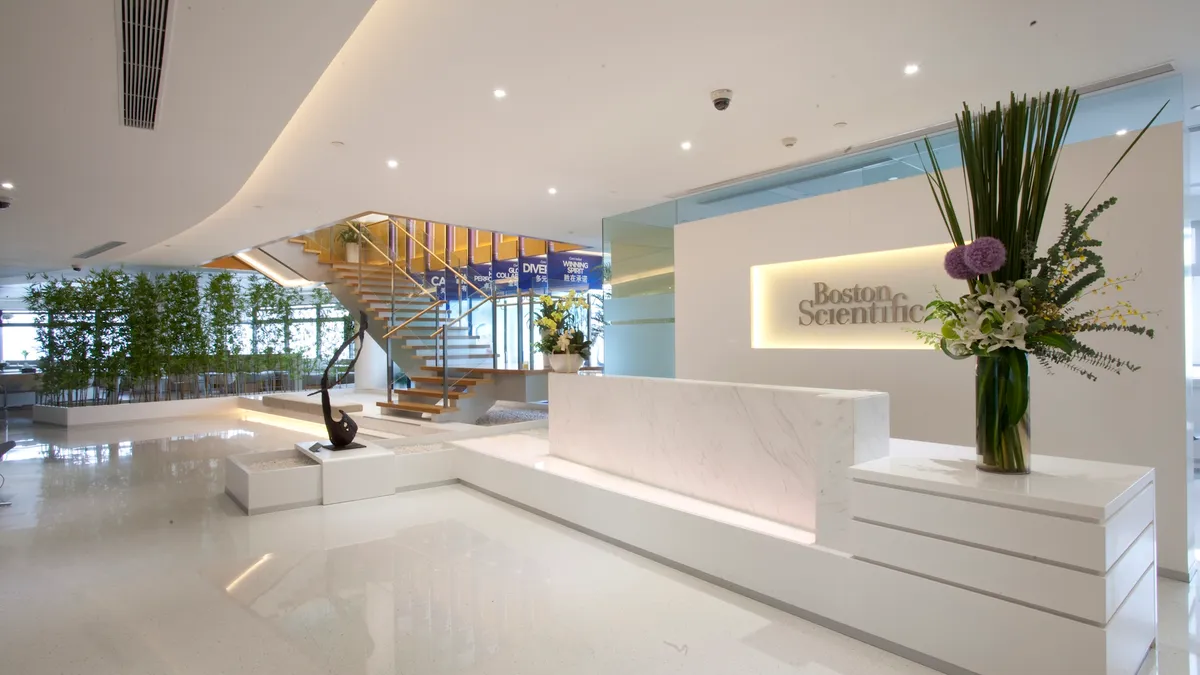Dive Brief:
- Boston Scientific on Wednesday reported fourth-quarter net sales of $3.1 billion, a 15% increase on an organic basis compared with the year-earlier period. Revenue was in line with Wall Street estimates, but the company issued a forecast for first-quarter and full-year sales below analyst expectations. The company's shares fell as much as 5% in Wednesday morning trading on the news.
- CEO Mike Mahoney told investors during a Wednesday earnings call that the omicron surge and macroeconomic pressures had an impact in December and January. As a result, Boston Scientific's first-quarter net sales growth is expected to be in the range of about 5% to 8% on an organic basis versus a 10% year-to-year consensus.
- Looking ahead, Mahoney said while Boston Scientific anticipates "less of a COVID impact on underlying procedures" for this year compared with 2021, the company has provided a "wider range to account for uncertainty" related to coronavirus variants and healthcare staffing shortages. Net sales for 2022 are expected rise about 6% to 8% on an organic basis versus the 8.8% year-to-year consensus.
Dive Insight:
Boston Scientific, like other procedure-dependent medical device companies this earnings season, is feeling the sting of the omicron surge, healthcare staffing shortages and supply chain constraints. The highly contagious omicron variant impacted procedure volumes in the fourth quarter, according to Mahoney, who told investors on Wednesday that near-term macroeconomic pressures will continue to weigh on the company in 2022.
On Wednesday's call, CFO Dan Brennan said Boston Scientific in the fourth quarter faced "headwinds" on gross margins including the cost of running manufacturing plants with COVID-19 measures, increased freight costs and higher direct labor wages. Brennan noted that as the omicron variant surged in December, the company experienced higher levels of absenteeism in its plants and "price pressure on direct material costs."
The CFO added the omicron surge and macroeconomic challenges "intensified" in December and January and as a result Boston Scientific's gross margins in the first half of 2022 are expected to be below those of the year-earlier period.
"We anticipate that the second half of 2022, gross margins will be improved versus the first half, driven by lower COVID-related headwinds and recognition of full 2022 standard cost improvements," Brennan said, noting that the company's longer-term goal is to return to at least the 72% pre-pandemic gross margin level "as global supply chain disruptions and inflation lessen over time."
SVB Leerink analysts in a Wednesday note observed that despite the omicron surge and hospital labor shortages, Boston Scientific "delivered organic growth vs. 4Q19 across 5 of 7 business segments" except for cardiac rhythm management and neuromodulation.
Despite the omicron impact on procedure volumes in the fourth quarter, Mahoney said the company is "extremely pleased" with the performance of the Watchman left atrial appendage closure device "as sales surpassed our expectations." In 2021, the CEO said the device had consistent performance with double-digit sales growth resulting in full-year revenue of $830 million, approximately $100 million ahead of estimates and a 68% increase compared with 2019.
"We continue to expect Watchman to be a significant growth driver for Boston Scientific in 2022 and beyond," Mahoney told investors.
However, Watchman's monopoly came to an end last year when Abbott Laboratories received FDA approval for its competing Amplatzer Amulet device in August. Abbott is expected to quickly grab market share from Boston Scientific, according to recent physician surveys, even though Watchman is still predicted to remain the market leader.
Mahoney acknowledged on Wednesday's call that Boston Scientific in 2022 "will lose some share" but the company is "very confident" in the performance of the newest generation Watchman FLX.
SVB Leerink analysts said they "remain on the sidelines for now" as they "watch to see how various market dynamics play out, not only around COVID and ongoing labor shortages but also a competitive launch for Watchman, which has been and will continue to be a meaningful contributor to top-line growth."
Truist analysts wrote in a note that "investors had been prepared for a weak 1Q guide, so a below-Street organic 2022 revenue growth outlook shouldn't come as all that much of a surprise." Still, the analysts added that "the combination of a 4Q margin/EPS miss as well as a 6% below-Consensus 2022 EPS outlook may be viewed as a further-let down, especially given that BSX is a crowded long."
Boston Scientific was one of the most active medtechs last year in terms of M&A, with five acquisitions. Mahoney said the company expects the $1.75 billion purchase of Baylis Medical, announced in October, to close in the first quarter of 2022. The company has $1.9 billion in cash on hand as of Dec. 31 and tuck-in acquisitions will continue to be Boston Scientific's strategy going forward, according to Brennan.
"You're unlikely to see the level of activity that you saw in 2021. But you should certainly look for a handful of tuck-in deals for us in 2022," Mahoney added.












